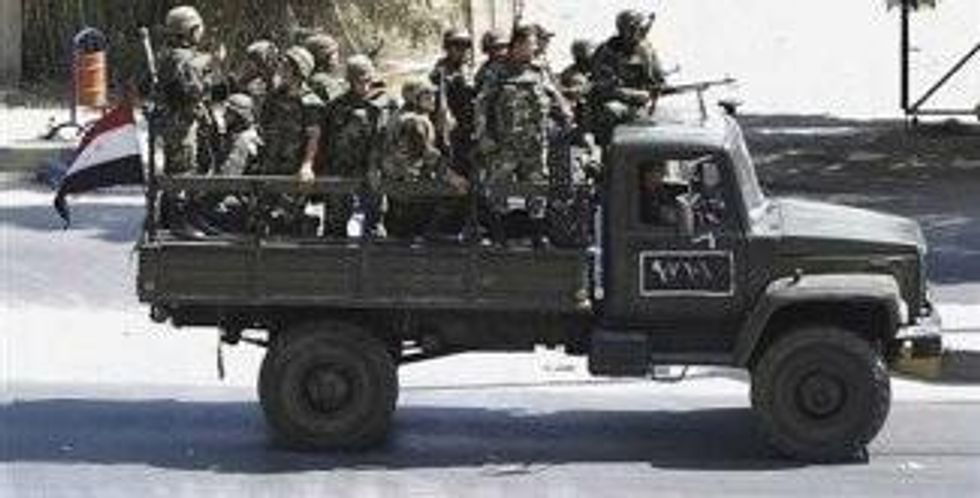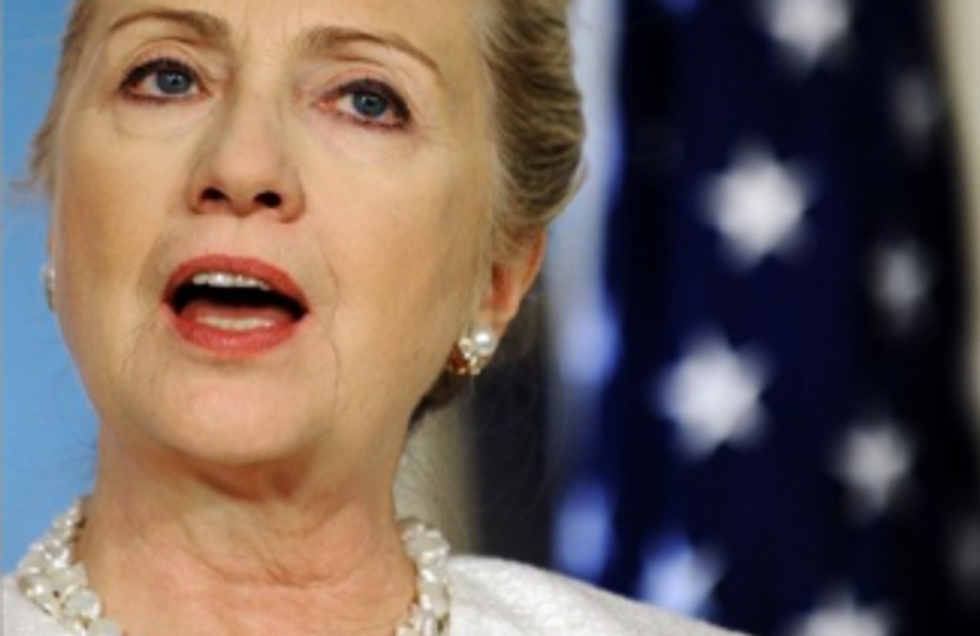Events inside and outside of Syria today are leading to increased domestic and international tensions as President Bashar al-Assad's regime faces increased pressure from the United Nations, while Syrians who have risen up in opposition to Assad contend with continued violence at the hands of state security forces. At play beneath today's various developments are the complex national interests at work among the United Nations Security Council members and the role played by regional powers including the United States, the Arab League, Saudi Arabia, and others.
Assad troops fight back against Syria rebels
Reutersreports:
Street battles raged at the gates of the Syrian capital on Monday as President Bashar al-Assad's troops sought to consolidate their grip on suburbs that rebel fighters had taken only a few miles from the center of government power.
Russia, a U.N. Security Council member and one of Syria's few allies, said Assad's government had agreed to talks in Moscow to end the Syrian crisis, but a major opposition body rejected any dialogue with him, demanding he step down.
The new fighting and Russian diplomacy came as the Arab League and France prepared to lobby the Security Council to act on a peace plan that would remove Assad from power, in a bid to staunch the flow of blood from Syria's attempt to crush a popular uprising and armed insurgency against Assad.
Activists and residents said Syrian troops now had control of Hamouriyeh, one of several districts where they have used armored vehicles and artillery to beat back rebels who came as close as 8 km (5 miles) to Damascus.
An activist said the Free Syrian Army (FSA) - a force of military defectors with links to Syria's divided opposition - mounted scattered attacks on government troops who advanced through the district of Saqba, held by rebels just days ago.
"Street fighting has been raging since dawn," he said, adding tanks were moving through a central avenue of the neighborhood. "The sound of gunfire is everywhere."
***
Syria opposition warns of 'massacre' near Damascus
Agence France-Pressereports:
The opposition Syrian National Council warned on Monday of a possible "massacre" of hundreds of young men rounded up by security forces in a town near Damascus.
It voiced "fears over a possible liquidation of hundreds of young men that Syrian security services have gathered in a public square in Rankus," 40 kilometres (25 miles) north of the capital, in a statement received in Nicosia.
The SNC called for the Arab and international media "to act quickly to follow this issue."Security forces "raided Rankus this morning, backed by tanks and rocket-launchers ... and launched a campaign of arrests," it said.
"The authorities have cut off electricity, telephone lines and water. They have imposed a siege on Rankus, preventing food and medical aid from entering" the town of 25,000 inhabitants.
***
Clinton urges Security Council to act on Syria
In a separate AFPreport:
US Secretary of State Hillary Clinton said Monday that the UN Security Council "must act" on Syria to end President Bashar al-Assad's "violent and brutal attacks" against demonstrators.
Amid Russian opposition to a tough resolution on Syria, Clinton said that she would travel to the United Nations on Tuesday to "send a clear message of support to the Syrian people: we stand with you." [...]
Clinton will join other top officials including French Foreign Minister Alain Juppe and Arab League chief Nabil al-Arabi at Tuesday's Security Council meeting, which comes as violence flares in Syria.
But Russia, a main military supplier to Syria, has said that it will use its veto against a draft Security Council resolution, pointing to language against arms deliveries.
***
Hamid Dabashi, professor of comparative literature at Columbia University and author the forecoming book, The Arab Spring, put the Syrian uprising in more coherent and critical context during an interview with The Real News Network's Paul Jay this morning.
Saudi's and US attempt to control outcome of Syrian revolt
...What we're witnessing here from the initial stages of the Arab Spring in Tunisia, then in Egypt, and Libya, Yemen, Bahrain, is a series of grassroots, genuine revolutionary uprisings against the status quo. Obviously it is not just against the figure of Ben Ali or the figure of Hosni Mubarak. These revolutionary uprisings are deeply rooted in economic terms, in social terms, in cultural terms. And there is[...] absolutely not a grain of doubt that we're dealing with world-historic circumstances, that people want to change their regimes.
But changing the regimes means changing their circumstances, changing their lives, bettering their lives. It doesn't mean that [Syrians opposition members] want the World Bank and IMF and American and European businessmen going there and managing their affairs. This is where [the dilemma] enters[...] You're dealing, on one hand, with grassroots revolutionary uprisings, and on the other, with the fact that United States, European Union, and their regional allies, which include some Arab countries, such as United Arab Emirates or Saudi Arabia, etc., they want to micromanage these revolutionary uprisings in a manner that suits their benefit.
And then, like in Libya... people are confronted with this dilemma, what to do when you have severe crackdown, militant violent crackdown, on part of Gaddafi or on part of Hafiz Assad. These forces, such as Saudi Arabia or United States, European Union, appear as an angel of mercy that are helping the people, whereas the fact of the matter is that they are after their own economic interest. This is not something [...] that I or any other observer says; this is what President Obama said on the night that he declared that United States is going along with the NATO bombing or no-fly zone over Libya. He said that of course there are many places--he had Bahrain in mind--that United States could theoretically intervene, but we only intervene when our interests and our values coincide. And as I [suggest], their values are decided by their interests.
On the subject of military intervention, Dabashi was quite emphatic, say, "I remain as steadfastly [in] opposition to any kind of intervention. Whether they call it 'humanitarian' or 'military' makes no difference."
Dabashi's views on 'Western intervention' find an ally in Palestinian writer and political activist Nasser Ibrahim. Writing at the Alternative Information Center (for which he is co-director) he offered his thoughts on Syria from the complex vantage of Palestinians, who have relied on Syria in their own fight against Israeli occupation:
Concerning the position of the Palestinian leftist parties [such as the PFLP] on the Syrian events, if, on one hand, they stand with democracy and freedom and push for the related reforms, on the other hand they are against any attack that might harm the role of Syria as a resistance country opposed to American hegemony. They believe that the situation should be solved internally without any NATO or GCC (Gulf Cooperation Council) intervention.
Moreover, Hamas - which has roots in the Muslim Brotherhood and maintains close ties with the organization - has been surprisingly quiet before the power escalation of their regional brothers. "Hamas is confused. It knows that the main opposing party in Syria is the Muslim Brotherhood but it can't deny the help received in the past by the Syrian leadership. [...]
I believe 99% of Palestinians are against the NATO intervention in Syria. The 50% supports the change in the Syrian regime and [hopes to see it] turn into a democratic country but fears a possible influence from both US and GCC countries into the Syrian internal politics. Furthermore, Palestinians agree with Syria's support to Hezbollah but, if it comes to establish a Palestinian state under Hamas, well... The secularists and Fatah strongly oppose it.
Watch the full Real News Network interview with Dabashi:
###


